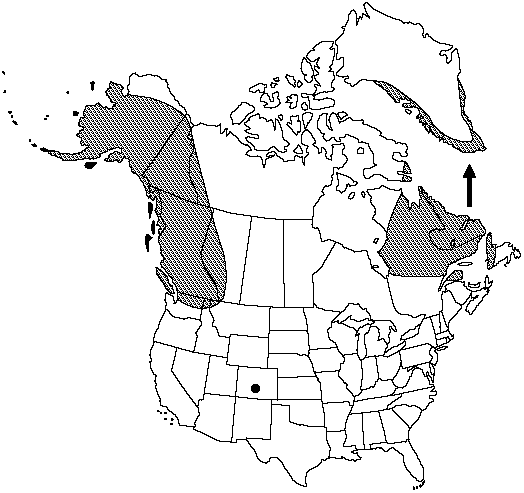Diphasiastrum alpinum
Preslia 47: 107. 1975.
Horizontal stems mainly shallowly buried, 0.5–3 mm wide, sometimes emerging, 1.1–2.2 mm wide; leaves appressed, spatulate to lanceolate, 1.5–3.8 × 0.5–1.4 mm, apices truncate. Upright shoots 6–14 cm, clustered, fasciculate, branching successively 3–5 times; leaves on upright main-stem ascending, deltate-ovate, 3.5–4 × 0.8 mm, apices needlelike. Branchlets square in cross-section, 1.8–4 mm wide, annual bud constrictions abrupt and conspicuous; underside often glaucous, concave; upperside green, dull to faintly shiny, convex. Leaves on branchlets 4-ranked, overlapping; upperside leaves appressed, lanceolate, 3–5.8 mm, free portion of blades 1.7–2.9 × 0.1–1.1 mm; lateral leaves strongly divergent, 3.3–6.5 × 1.8–2.4 mm, margins revolute; underside leaves well developed, perpendicular to stem, 1.3–3.3 × 0.6–1.3 mm, unique in genus in having base contracted, blade flaring, and margins becoming parallel. Peduncles absent. Strobili solitary, 5–30 × 2–4 mm, sterile tips absent. Sporophylls deltate to nearly cordate, 2.2–3.5 × 1.6–3 mm, apices gradually tapering. 2n = 46.
Habitat: Dry conifer or mixed forests, grassy mountain slopes.
Distribution

Greenland, Alta., B.C., Nfld. and Labr. (Nfld.), N.W.T., Que., Yukon, Alaska, Colo., Idaho, Mont., Wash., Europe, Asia in Japan
Discussion
The branchlet leaves of Diphasiastrum alpinum are unique in the genus, and the trowel-shaped underside leaves with their flared and rolled blades and contracted bases are particularly unusual. The leaves of the other North American species are much simpler in shape and contour.
Selected References
None.